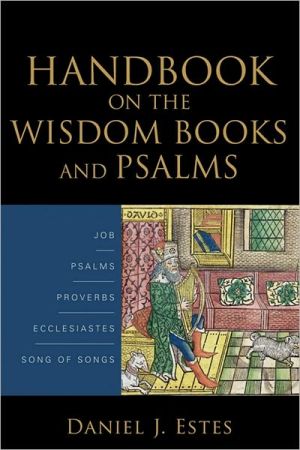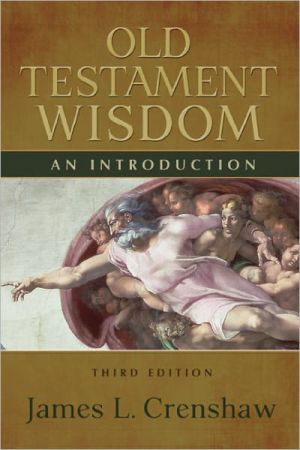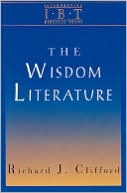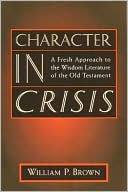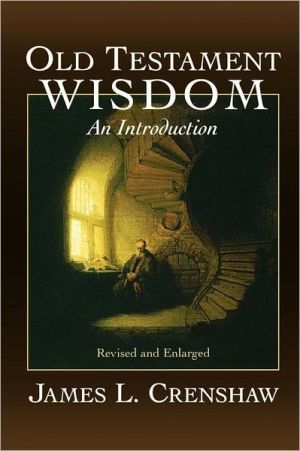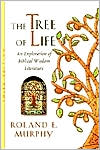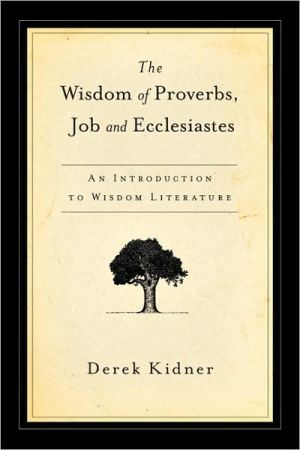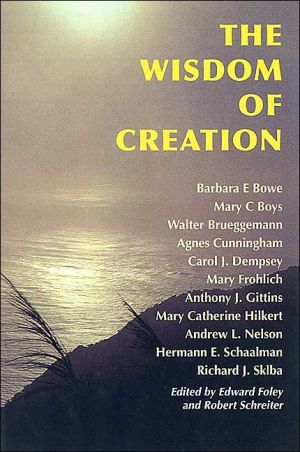Handbook on the Wisdom Books and Psalms
"In this handbook Estes takes his readers by the hand to guide them through some of the more difficult books of the Old Testament. The introductory sections provide excellent orientation to their contents and to appropriate reading strategies, while the commentary explains the thought flow of the biblical writers and, importantly, the sometimes apparent breaks in thought flow. Estes writes lucidly and informs his discussion from his acquaintance with a wide range of current biblical...
Search in google:
This valuable resource introduces readers to the Old Testament books of wisdom and poetry--Job, Psalms, Proverbs, Ecclesiastes, and Song of Songs--and helps them better understand each book's overall flow. Estes summarizes some of each book's key issues, offers an exposition of the book that interacts with major commentaries and recent studies, and concludes with an extensive bibliography. Now in paperback. Publishers Weekly The Old Testament wisdom literature contains beautiful songs of worship and praise (Psalms), pithy and moralistic aphorisms (Proverbs), lyrical erotic poems (Song of Songs), world-weary philosophical reflections (Ecclesiastes) and probing poetry about the nature of evil (Job). In this engaging and helpful survey of the types and themes of wisdom literature, Estes, who teaches at Cedarville College in Cedarville, Ohio, provides a generous introduction for readers interested in the interpretation of these books. Each chapter examines the authorship and date of a particular book and proceeds to discuss its structure, style and major themes. Estes then provides an illuminating exposition of the writing and an invaluable bibliography that students of wisdom literature can use to enhance their understanding. Estes's survey represents all major positions on introductory matters in judicious fashion. Thus, while Solomon is traditionally thought to be the author of Proverbs, Estes concludes that Solomon cannot be the final compiler of the collection even though he might have played a role in the beginning of the process. Estes's book joins the other volumes in this series in providing significant introductions to the literature of the Old Testament. (Dec.) Copyright 2005 Reed Business Information.
HANDBOOK ON THE WISDOM BOOKS AND PSALMS\ \ By Daniel J. Estes \ Baker Academic\ Copyright © 2005 Daniel J. Estes\ All right reserved.\ ISBN: 0-8010-2699-7 \ \ \ \ Chapter One\ Job \ The book of Job is renowned as one of the greatest masterpieces, not only in the Bible, but also in all of world literature. In telling the story of Job, a man who in a day went from having everything to suffering utter collapse, it addresses some of the most profound theological and philosophical questions posed by humans. This ancient text, which has no precise literary parallels, has prompted interpreters to look in many different directions as they seek to understand its message.\ Authorship and Date\ The book of Job includes no claim of authorship or date of composition, nor does it even contain explicit historical allusions that could assist in locating its original setting. As Murphy (1999: 6) notes, "Any dating of the book has to proceed on the basis of tentative evidence, and nothing is certain." To complicate the matter, the book is set outside of Israel, so the Old Testament historical narratives cannot be used as a guide to the temporal background of Job. In light of all this, it is not surprising that even evangelical scholars have suggested a wide variety of dates for the book, ranging from the time of Moses to the eighth century B.C. (Dillard and Longman 1994: 200). Many nonevangelical scholars argue for dates well into the Persian period. Although the Babylonian Talmud, in Baba Batra 14b, attributes the book to Moses, the passage also indicates that the rabbinical scholars had numerous opinions on the authorship and date of the book (Dhorme 1967: lxi). Thus, from the beginning of biblical interpretation this anonymous book has prompted debate.\ Making the issue even more difficult is uncertainty about the genre of the book. Zuck (1985: 716) regards the book as an eyewitness record of Job's experience. If that is the case, then the time of composition would be determined by the date of the literary setting of the book. That premise, however, is open to question. For millennia writers have penned texts that they have set in historical periods different from their own. For example, Shakespeare composed his drama about Julius Caesar some sixteen hundred years after the actual events. Similarly, biblical writers such as the narrator of the primeval history in Gen. 1-11, the Chronicler, and Luke retold events that occurred long before the composition of their biblical texts. At the very least it must be recognized that the epilogue of the book of Job, with its statement that Job lived for 140 years after the events described therein, demands a date of final composition long after the dialogues between Job and his friends. Therefore, it may well be the case that the entire book of Job was written long after the events that it portrays.\ Many interpreters have sought to establish the date of the writing of the book of Job by examining its language and themes, but these too are not definitive for dating. It is evident that the book uses many forms that parallel Canaanite and Aramaic literature, but as Hartley (1988: 17-18) notes, there are no extant Northwest Semitic texts that represent the precise dialect used in Job. Although many have argued that wisdom was a late, postexilic development in Israel, it must be considered that Babylonian and Egyptian texts that parallel the themes of Job can be dated at least as early as 1700 B.C. (Bullock 1988: 73).\ A further challenge to dating the book comes from the likelihood that Job is set in a foreign context, probably Edom or perhaps Aram (Syria). The existing literature from Edom is negligible (Harrison 1969: 1023), and the early Aramaic texts are only a little more numerous, yielding only the slightest basis for comparative textual and linguistic study.\ Even though the author and the date of composition cannot be determined in any specific terms, some general observations can be made about the nature of the person who wrote the book of Job. The author is anonymous, but obviously is comfortable with the language and forms of wisdom (Hartley 1988: 15). It is even more evident that the author has an unusual sensitivity to, and likely an experience of, human suffering (Pope 1973: xli). For this author, suffering entails the full existential reality of pain, because the book refuses to reduce Job's predicament to a mere theological case study. Although it is impossible to verify, it would not be surprising to learn that the insights in this masterpiece were forged in the fires of intense personal pain and loss. In addition, the writer clearly was intrigued with the full range of life experiences, as Scheindlin (1998: 24) notes: "Its energy and exuberance, palpable from the very beginning and hardly ever fading during the work's long course, keep present before us the fact that we are reading the work of a writer who is fascinated with this life, troubled as it is, a man who never wearies of the variety and vividness of the multitude of things that life offers for our observation."\ The proposed dates for the composition of the book of Job range from the patriarchal period to the fourth century B.C. Harrison (1969: 1040) argues persuasively from the details of the text that the book fits well into the patriarchal milieu in the early second millennium B.C. If it is assumed that the book contains transcripts of the conversations recorded as they were spoken, then the date of composition would need to be in the patriarchal period as well. This line of reasoning led to that conclusion in the Talmud, by church fathers such as Eusebius, and by numerous Christian scholars even to the present time.\ Some scholars have suggested Moses as a plausible author, although there is no hard evidence to prove this hypothesis. For example, in 1637 Jacques Bolduc proposed that Moses translated an earlier Aramaic text into Hebrew, and this led to the book's inclusion in the Old Testament canon (Archer 1974: 456). The book of Job, however, bears little resemblance to the style of the Pentateuch, and so it is difficult to sustain the Mosaic connection.\ Because the book of Job is such an extraordinary example of wisdom literature, it is not surprising that some interpreters have placed its composition in the time of Solomon. Archer (1974: 459) offers a cumulative argument in which features of the Solomonic age plausibly coincide with features of Job, but he admits that his reasoning should not be regarded as conclusive, because many of the same features are compatible with an earlier date of composition.\ Numerous scholars have sought to date the book of Job by correlating its themes with various epochs in the history of Israel. For example, Wolfers (1995a: 14-17) argues that Job is an allegory written in the eighth century B.C. in the face of the Assyrian invasion, and it was designed to teach that the Mosaic covenant was no longer valid for Israel. Hartley (1988: 19) points to the allusions to Canaanite religion and parallels to Isa. 40-55 as he posits a preexilic date in the late eighth century B.C. It must be remembered, however, that arguments from literary dependence often founder on establishing a clear direction of dependence. So, for example, LaSor (1996: 473) holds that Job must have come after Isa. 40-55, because it comments on that biblical text, whereas Hartley contends that Isaiah was influenced by Job.\ Others have suggested that the theme of suffering, which dominates the book of Job, is best correlated with the books of Jeremiah and Lamentations, as they detail the suffering of the fall of Jerusalem and the Babylonian exile. Suffering, however, is a theme that is prevalent throughout world literature (Andersen 1976: 62-63). Even more to the point, the book of Job focuses on undeserved individual suffering, whereas the exile entailed national punishment for blatant sin against God (Hartley 1988: 19).\ In his thorough study of the book of Job, Dhorme (1967: clxix) reasons from purported similarities to Zechariah and Malachi that the book was composed well into the postexilic period, between 500 and 450 B.C. Crenshaw (1986: 312) comes to a similar conclusion, on different grounds, by arguing that the features similar to the Aramaic language, the figure of Satan, and an insistence on rational order in the universe all support a date in the late sixth or early fifth century B.C.\ Eissfeldt (1965: 470) holds that Job was written in the fourth century B.C., building his case primarily from its theme of retribution and the Aramaic coloring of the language. Treves (1995: 268) argues for a very late date of 188-170 B.C., mainly because of purported parallels to Hellenistic texts. Nevertheless, as Hartley (1988: 18) observes, all of the points used to support such a late date are debatable, leaving the time of the composition of the book of Job an open question. As Cheney (1994: 275) concludes, the linguistic factors that appear to be Aramaic may more likely have been intended to indicate ancientness or foreignness.\ Unity\ Just as scholars are sharply divided over the authorship and date of composition of the book of Job, so also there is a wide variety of positions about the unity of the text. The interpretive alternatives range from a single author who wrote the book to a collection of numerous texts that were brought together in some undetermined fashion. In light of the range of options, it is wise to keep in mind the methodological counsel of Gordis (1978: 578): "The existence of one book of Job is a datum, while the theory of two books is a hypothesis. Thus, the burden of proof rests upon the proponent of the new theory. Its power to persuade depends upon the degree to which it is free from difficulties of its own. Even more important is the extent to which it offers a more coherent interpretation, or, to borrow a term from the philosophy of science, a simpler and more elegant explanation of the phenomena being investigated."\ Andersen (1976: 41-42) argues that unity is not an essential feature of divine inspiration. Consequently, the question of the unity of the book of Job must not be decided on a priori theological grounds, but must be answered by investigating the evidence within the text. The most prominent feature of the extant book is the division between the prose framework and the poetic dialogues. Many scholars have concluded that the portrayals of Job in the two sections cannot be reconciled, because in the framework he is a model of patience, but in the dialogues he sounds defiant against God (Crenshaw 1986: 305-6). In addition, the poem of praise to wisdom in chapter 28 and the speeches of Elihu in chapters 32-37 frequently are viewed as interpolations that interrupt the flow of the dialogue section (Whybray 1998: 22). In light of these factors, the majority of scholars holds that the original kernel of the book contains the dialogues between Job and his friends. At some subsequent time the remaining poetic sections were added, and finally the editor reworked an old epic account in order to provide a theological and life setting for the text (Hartley 1988: 24).\ Even though the disunity of the book typically is assumed, there are some weighty arguments for its unity that should not be dismissed. As Murphy (1999: 114) points out, there is no extant manuscript evidence of anything but the content of the book as it stands. The earliest textual evidence, from the Septuagint and the Targum of Job, supports the present sequence of chapters and verses. Thus, the burden of proof falls upon those who contend that the book of Job originally was different from what the extant record of transmission validates. The proposed compositional histories, then, are marked by subjective and hypothetical claims rather than by conclusive proof.\ In fact, a close reading of the book of Job reveals clear design and unity. After analyzing the narrative plot of the book, Habel (1985: 35) concludes, "The book of Job reveals an underlying structure which gives coherence to the work as a literary whole. Prologue, dialogue speeches, and epilogue are integrated into a total artistic work through this plot structure. This unity, however, extends beyond the narrative plot to include terminological, thematic, and literary features. The integrity of the work is evident in its overall construction, the setting of its characters, and the interrelationship of its several parts." This evidence of literary unity cannot determine whether a single author composed the text in this unified fashion or the final redactor skillfully brought all the constituent parts together into an integrated whole (Dhorme 1967: xcviii-xcix). It does, however, subvert the claim that the text as it now reads must be rearranged and spliced together in order to make sense of it.\ The juxtaposition of the prose framework and the poetic dialogues is not an unfortunate anomaly; rather, it is a literary pattern employed by many texts in ancient Near Eastern and world literature. Prominent texts such as the Code of Hammurabi, the Bhagavad Gita, and the Decameron (Harrison 1969: 1039; Habel 1985: 25) use a frame as an interpretive context for the embedded text. As Whybray (1998:11) remarks, placing an extended poem within a prose narrative is not at all unfamiliar in ancient Near Eastern literature, so the prose-poetry-prose structure is actually an argument in favor of the intended unity of the entire book of Job.\ A careful reading of the book reveals that the prose framework and the poetic dialogues are necessarily linked together. Clines (1989: lviii) astutely notes, "It is improbable that the prose narratives ever formed an independent whole; for the narrative of the arrival of the three friends in 2:11-13 is plainly designed to preface the speeches, and Yahweh's closing address to the friends (42:7-8) makes no sense unless the friends had been speaking words for which God could reproach them." In a similar way, the poetic dialogues lack rationale and context apart from the interpretive key provided in the prologue, and they find closure only in the words of the epilogue. In particular, the assessment of Job by Yahweh both in the prologue (1:8; 2:3) and in the epilogue (42:7-8) underlies the intense questions of the dialogues, and an accurate assessment of the main character cannot be made apart from these divine evaluations (Janzen 1985: 23).\ The poem in praise of wisdom in chapter 28, the speeches by Elihu in chapters 32-37, and the speeches by Yahweh in chapters 38-41 frequently are regarded as later additions to the dialogues. Each of these sections, however, contributes to the overall argument of the book of Job. The poem in Job 28 is a transition from the three rounds of dialogue to the three monologues by Job (29-31), Elihu (32-37), and Yahweh (38-41). This serene interlude that follows the heated exchanges between Job and the friends serves to provide theological perspective. Their debate is over, and yet they have not found wisdom. The final verse of Job 28 states that the fear of the Lord is wisdom, thus setting the stage for Yahweh's entrance in chapter 38. Humans cannot discover God's wisdom by their own reasoning, so he must speak if wisdom is to be achieved. Job 28, then, is "intended to prepare Job and the audience to hear Yahweh's words by teaching explicitly that Yahweh alone can reveal insight into the true order of the universe" (Hartley 1988: 27).\ The speeches of Elihu also serve an important function in the unified message of the book (Waters 1999a). In other biblical texts, young wise men such as Joseph and Daniel saved the day when the recognized authorities had failed, and Elihu tries to assume that role (Gowan 1992: 92-94). After deferring to the older men who represent traditional wisdom rooted in experience, Elihu inserts himself into the discussion as the voice of youthful insight. Elihu evaluates the dialogues, concluding that both Job and the friends were wrong. According to Elihu, Job regarded himself as more righteous than God, and the friends had failed to refute Job adequately. As Elihu proceeds in his turgid monologue, it becomes evident through his numerous allusions and quotations that he is primarily rehashing the earlier speeches. Neither the older wisdom nor the youthful perspective, then, is sufficient to resolve Job's problem. Elihu, however, also touches on several themes that point ahead to the speeches by Yahweh. Thus, without stating it explicitly, the author suggests that if an answer is to be found to Job's predicament, Yahweh must speak. At the same time, "the long delay caused by Elihu's lengthy speeches leads the reader to despair of Yahweh's appearance. The more distant is Job's summons for Yahweh, the less likely it is that such an eventuality will take place" (Wilson 1996b: 92). In the overall structure of the book of Job, Elihu clears the stage so that Yahweh can make his entrance after all human resources have been found wanting.\ (Continues...)\ \ \ \ \ Excerpted from HANDBOOK ON THE WISDOM BOOKS AND PSALMS by Daniel J. Estes Copyright © 2005 by Daniel J. Estes. Excerpted by permission.\ All rights reserved. No part of this excerpt may be reproduced or reprinted without permission in writing from the publisher.\ Excerpts are provided by Dial-A-Book Inc. solely for the personal use of visitors to this web site. \ \
JobPsalmsProverbsEcclesiastesSong of SongsIndex
\ Publishers WeeklyThe Old Testament wisdom literature contains beautiful songs of worship and praise (Psalms), pithy and moralistic aphorisms (Proverbs), lyrical erotic poems (Song of Songs), world-weary philosophical reflections (Ecclesiastes) and probing poetry about the nature of evil (Job). In this engaging and helpful survey of the types and themes of wisdom literature, Estes, who teaches at Cedarville College in Cedarville, Ohio, provides a generous introduction for readers interested in the interpretation of these books. Each chapter examines the authorship and date of a particular book and proceeds to discuss its structure, style and major themes. Estes then provides an illuminating exposition of the writing and an invaluable bibliography that students of wisdom literature can use to enhance their understanding. Estes's survey represents all major positions on introductory matters in judicious fashion. Thus, while Solomon is traditionally thought to be the author of Proverbs, Estes concludes that Solomon cannot be the final compiler of the collection even though he might have played a role in the beginning of the process. Estes's book joins the other volumes in this series in providing significant introductions to the literature of the Old Testament. (Dec.) Copyright 2005 Reed Business Information.\ \
